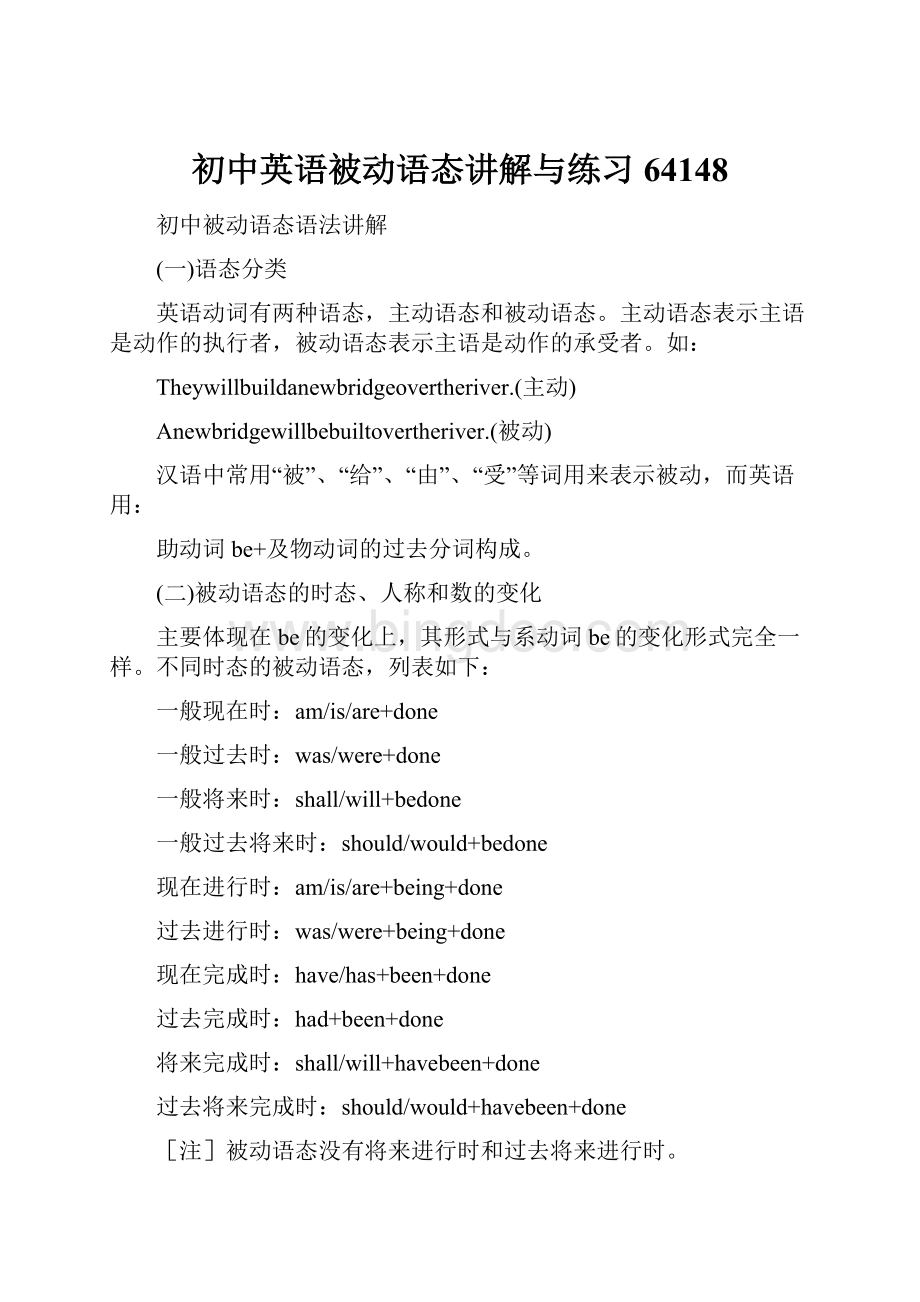初中英语被动语态讲解与练习64148.docx
《初中英语被动语态讲解与练习64148.docx》由会员分享,可在线阅读,更多相关《初中英语被动语态讲解与练习64148.docx(14页珍藏版)》请在冰点文库上搜索。

初中英语被动语态讲解与练习64148
初中被动语态语法讲解
(一)语态分类
英语动词有两种语态,主动语态和被动语态。
主动语态表示主语是动作的执行者,被动语态表示主语是动作的承受者。
如:
Theywillbuildanewbridgeovertheriver.(主动)
Anewbridgewillbebuiltovertheriver.(被动)
汉语中常用“被”、“给”、“由”、“受”等词用来表示被动,而英语用:
助动词be+及物动词的过去分词构成。
(二)被动语态的时态、人称和数的变化
主要体现在be的变化上,其形式与系动词be的变化形式完全一样。
不同时态的被动语态,列表如下:
一般现在时:
am/is/are+done
一般过去时:
was/were+done
一般将来时:
shall/will+bedone
一般过去将来时:
should/would+bedone
现在进行时:
am/is/are+being+done
过去进行时:
was/were+being+done
现在完成时:
have/has+been+done
过去完成时:
had+been+done
将来完成时:
shall/will+havebeen+done
过去将来完成时:
should/would+havebeen+done
[注]被动语态没有将来进行时和过去将来进行时。
(三)常见的八种时态中的被动语态
1.一般现在时:
(1)Peoplegrowriceinthesouthofthecountry.
Riceisgrowninthesouthofthecountry.
(2)Theschooldoesn'tallowustoenterthechemistrylabwithoutateacher.
Wearenotallowedtoenterthechemistrylabwithoutateacher.
2.一般过去时:
(1)Theyagreedonthebuildingofanewcarfactorylastmonth.
Thebuildingofanewcarfactorywasagreedonlastmonth.
(2)Thestudentsdidn'tforgethislessonseasily.
Hislessonswerenoteasilyforgotten
3.一般将来时:
(1)Theywillsendcarsabroadbysea.
Carswillbesentabroadbysea.
(2)Theywillgiveplentyofjobstoschool-leavers.
Plentyofjobswillbegiventoschool-leavers.
4.过去将来时:
(1)Themanagersaidtheywouldcompletetheprojectbytheendoftheyear.
Themanagersaidtheprojectwouldbecompletedbytheendoftheyear.
(2)Theworkerstoldmetheywouldmendthecarassoonaspossible.
Theworkerstoldmethatthecarwouldbemendedassoonaspossible.
5.现在进行时:
(1)TheradioisbroadcastingEnglishlessons.
Englishlessonsarebeingbroadcastedontheradio.
(2)Wearepaintingtherooms.
Theroomsarebeingpainted.
6.过去进行时:
(1)Theworkersweremendingtheroad.
Theroadwasbeingmended.
(2)Thistimelastyearwewereplantingtreeshere.
Treeswerebeingplantedherethistimelastyear.
7.现在完成时:
(1)Someonehastoldmethesportsmeetingmightbeputoff.
Ihavebeentoldthesportsmeetingmightbeputoff.
(2)Hehasbroughthisbookhere.
Hisbookhasbeenbroughthere.
8.过去完成时:
(1)WhenIgottothetheatre,Ifoundtheyhadalreadysoldoutthetickets.
WhenIgottothetheatre,Ifoundtheticketshadalreadybeensoldout.
(2)Peoplehadconsideredhimtobeagreatleader.
Hehadbeenconsideredtobeagreatleader
(四)含有情态动词的被动语态:
含有情态动词的被动语态是由“情态动词+be+及物动词的过去分词”构成。
(1)Youmusthandinyourcompositionsafterclass.
Yourcompositionsmustbehandedinafterclass.
(2)Hecanwriteagreatmanyletterswiththecomputer.
Agreatmanyletterscanbewrittenwiththecomputerbyhim.
(五)被动语态的使用
1.当不知道或没有必要指出动作的执行者时,常用被动语态,这时往往不用by短语。
“Mr.White,thecupwasbrokenafterclass.”
2.突出或强调动作的承受者,如果需要说出动作的执行者,用by短语。
TheserecordsweremadebyJohnDenver.
ThecupwasbrokenbyPaul.
3.当汉语句子的主语既不是动作的执行者,也不是动作的承受者时,这时常用in+名词作状语,而代替by短语。
ThesecarsweremadeinChina.
(六)主动语态变被动语态的方法
(1)Myauntinvitedmetoherdinnerparty.
主语谓语宾语
→Iwasinvited(bymyaunt)toherdinnerparty.
主语谓语宾语
(2)Theschoolsetupaspecialclasstohelppoorreaders.
→Aspecialclasstohelppoorreaderswassetupintheschool.
1.把主动语态的宾语变成被动语态的主语。
2.把主动语态的谓语变成被动语态的be+过去分词,时态要与原句保持一致。
3.把主动语态的主语变为介词by的宾语,放在被动语态里谓语动词之后,by短语可以省略。
如果原句主语是地名词作状语。
(七)语态转换时所注意的问题
1.把主动语态变为被动语态点名词,在被动语态中用in+地点时,其谓语动词的时态要与原句时态保持一致,其谓语动词的数要与新主语保持一致。
Wehaveboughtanewcomputer.
Anewcomputerhasbeenbought.(正确)
Anewcomputerhavebeenbought.(错误)
2.含有双宾语的主动句变被动句时,可分别将其中的一个宾语变为主语,另一个不动,一般变间接宾语为主语时比较多。
Myunclegavemeapresentonmybirthday.
Iwasgivenapresentonmybirthday.
如果把直接宾语(指物)改为主语,则在间接宾语(指人)前加适当的介词,如上句还可以说:
Apresentwasgiventomeyesterday.
注意:
1.一般在下列动词后,常在间接宾语前用介词to,如:
bring,give,hand,lend,offer,pass,pay,promise,sell,show,take,teach,tell等。
(1)Thebookwasshowedtotheclass.
(2)Mybikewaslenttoher.
2.一般在下列动词后,间接宾语前用介词for,如:
build,buy,cook,cut,choose,do,fetch,find,fix,get,keep,make,order,paint,play,sing等。
(1)Anewskirtwasmadeforme.
(2)Themeatwascookedforus.
(3)Somecountrymusicwasplayedforus.
3.由动词+介词或副词构成的短语动词,要把它们作为整体看,即把它们看成一个及物动词,介词或副词不可拆开或漏掉。
这类动词有:
不及物动词+介词,如:
agreeto,askfor,laughat,operatedon,listento,lookafter,thinkof,talkabout等。
(1)Thepatientisbeingoperatedon.
(2)Theproblemissolved.Itneedn'tbetalkedabout.
及物动词+副词:
如:
bringabout,carryout,findout,giveup,handin,makeout,passon,pointout,putaway,putoff,thinkover,turndown,workout,turnout等。
(1)Hisrequestwasturneddown.
(2)Thesportsmeetwillbeputoffbecauseofthebadweather
4.带复合宾语(宾语+宾补)的动词改为被动语态时,一般把主动结构中的宾语改为主语,而宾语补足语保留在谓语动词后面。
如:
(1)Wealwayskeeptheclassroomclean.
→Theclassroomisalwayskeptclean.
(2)Shetoldustofollowherinstructions.
→Weweretoldtofollowherinstructions.
注意:
在see,watch,hear,notice,listento,lookat,make,feel等动词后作宾语补足语的动词不定式都不带to,但改成被动语态后都带to,这时不定式为主语补足语,也就是说不定式作主语补足语不存在省略to的问题。
Weoftenhearhimplaytheguitar.
→Heisoftenheardtoplaytheguitar.
5.当主动句的主语是nobody,noone等含有否定意义的不定代词时,被动句中将其变为anybody,作by的宾语,并将谓语动词变为否定的被动语态。
如:
Nobodycananswerthisquestion.
误:
Thequestioncanbeansweredbynobody.
正:
Thequestioncannotbeansweredbyanybody.
6.当否定句中的宾语是anything,anybody,anyone等不定代词时,在被动句中应将其分别变为nothing,nobody,noone作主语,并将谓语动词变为肯定的被动语态。
如:
Theyhaven'tdoneanythingtomaketheriverclean.
误:
Anythinghasn'tbeendonetomaketheriverclean.
正:
Nothinghasbeendonetomaketheriverclean.
7.以who为主语开头的疑问句,变被动时,用bywhom放在句首:
Whowrotethestory?
误:
Whowasthestorywritten?
正:
Bywhomwasthestorywritten?
8.有些动词既是及物又是不及物,当它们和well,badly,easily等副词连用时,表示主语内在品质或性能,是不及物动词,用主动表示被动,这时不用被动语态,常见的有:
write,read,clean,sell,wash,cook等。
如:
(1)Theclothwasheseasily.这布很好洗。
(2)Thenewproductsellswell.这新产品很畅销。
对比:
Thebookssellwell.(主动句)
Thebooksweresoldout.(被动句)
Themeatdidn’tcookwell.(主动句)
Themeatwascookedforalongtime.(被动句)
9.下列情况主动句不能改为被动句:
第一,感官系动词一般用主动形式表示被动意义,如:
feel,look,seem,taste,sound,remain等。
(1)—Doyoulikethematerial?
—Yes,itfeelsverysoft.
误:
Itisfeltverysoft.
(2)Thefoodtastesdelicious.
误:
Thefoodistasteddelicious.
(3)Thepopmusicsoundsbeautiful.
误:
Thepopmusicissoundedbeautiful.
第二,谓语是及物动词leave,enter,reach,suit,have,benefit,lack,own等。
如:
(1)Heenteredtheroomandgothisbook.
误:
Theroomwasenteredandhisbookwasgot.
(2)Shehadherhandburned.
误:
Herhandwashadburned.
第三,一些不及物动词短语没有被动语态,如:
takeplace,breakout,belongto,loseheart,consistof,addupto等。
如:
Thefirebrokeoutinthecapitalbuilding.
误:
Thefirewasbrokeoutinthecapitalbuilding.
第四,不及物动词没有被动语态,如:
rise,happen,succeed,remain,lie等。
Whenwegottothetopofthemountain,thesunhadalreadyrisen.
误:
Thesunhadalreadybeenrisen.
Aftertheearthquake,fewhousesremained.
误:
Aftertheearthquake,fewhouseswereremained.
第五,宾语是反身代词,相互代词,同源宾语,不定式,v-ing形式及抽象名词等,不能变为被动句子的主语,如:
ItaughtmyselfEnglish.
误:
MyselfwastaughtEnglish.
Weloveeachother.
误:
Eachotherisloved.
10.在汉语中,有一类句子不出现主语,在英语中一般可用被动结构来表示,例如:
据说……Itissaidthat…
据报导……Itisreportedthat…
据推测……Itissupposedthat…
希望……Itishopedthat…
众所周知……Itiswellknownthat…
普遍认为……Itisgenerallyconsideredthat…
有人建议……Itissuggestedthat…
(1)Itisreportedthatitisgoingtoraintomorrow.
(2)ItiswellknownthatThomasEdisoninventedtheelectriclamp.
初中被动语态练习题
()1.ThePeople'sRepublicofChina__onOctober1,1949.
A.foundB.wasfoundedC.isfoundedD.wasfound
()2.English____inCanada.
A.speaksB.arespokenC.isspeakingD.isspoken
()3.ThisEnglishsong___bythegirlsafterclass.
A.oftensingsB.oftensangC.isoftensangD.isoftensung
()4.Thiskindofcar___inJapan.
A,makesB.madeC.ismakingD.ismade
()5.Newcomputers___allovertheworld.
A.isusedB.areusingC.areusedD.haveused
()6.Ourroommust___clean.
A.keepB.bekeptC.tobekeptD.tokeep
()7.-I'dliketobuythatcoat.-I'msorry.___.
A.itsoldB.it'ssellingC.It'sbeensoldD.ithadbeensold
()8.Anewhouse___atthecorneroftheroad.
A.isbuildingB.isbeingbuiltC.beenbuiltD.bebuilding
()9.Thekey___onthetablewhenIleave.
A.wasleftB.willbeleftC.isleftD.hasbeenleft
()10.Doctors___ineverypartoftheworld.
A.needB.areneedingC.areneededD.willneed
()11.Hisnewbook___nextmonth.
A.willbepublishedB.ispublishing
C.isbeingpublishedD.hasbeenpublished
()12.Japanese___ineverycountry.
A.isnotspokenB.arespokenC.isspeakingD.isnotspeaking
()13.Thesepapers___yet.
A.havenotwrittenB.havenotbeenwritten
C.hasnotwrittenD.hasnotbeenwritten
()14.Thesportsmeet___behelduntilnextweek.
A.didn'tB.won'tC.isn'tD.doesn't
()15.-Myshoesarewornout.
A.Can'ttheybemended?
B.Letmehavealookatit.
C.Howmuchdotheycost?
D.Can'ttheymended?
()16.___thewatchbeenrepairedyet?
Ibadlyneedit.
A.DoesB.HasC.IsD.Are
()17.___thesedesksbeneeded?
A.WillB.AreC.HasD.Do
()18.Why___totalkaboutityesterday?
A.didn'tameetingholdB.wasn'tameetingheld
C.wasn'theldameetingD.ameetingwasn'theld
()19.Whowasthebook___?
A.writeB.wroteC.writtenD.writtenby
()20.Where___theseboxesmade?
A.wasB.wereC.isD.am
()21.Theflowers___often.
A.mustbewaterB.mustbewateredC.mustwateredD.mustwater
()22.Thebooksmay___fortwoweeks.
A.bekeptB.beborrowedC.keepD.borrow
()23.Thebrokenbike____herebyMrSmith.
A.canmendB.canmendedC.canbemendD.canbemend
()24.Theoldbridgeinmyhometown___nextmonth.
A.isgoingtoberebuiltB.willrebuilt
C.aregoingtoberebuiltD.aregoingtorebuilt
()25.Theplay___atthetheatrenextSunday.
A.isgoingtobeshownB.willshownC.willshowD.isshown
()26.Theoldstonebridge___nextweek
A.isgoingtoberebuiltB.willberebuild
C.aregoingtoberebuiltD.willrebuild
()27.Nowthesemagazines__inthelibraryforalongtime.
A.havekeptB.arekeepingC.havebeenkeepingD.havebeenkept
()28.Thepot___for___hotwater
A.used;keepingB.wasused;keepingC.isused;tokeepD.areused;keep
()29.Tea___inthesouthofChina.
A.growsB.isgrownC.weregrownD.willgrow
()30.Thebridges___twoyearsago.
A.isbuiltB.builtC.werebuiltD.wasbuilt
()31.Wetclothesareoften___upnearafireinrainyweather
A.hangB.hangedC.hangingD.hung
()32.Theriversmellsterrible.Peoplemust___dirtythingsintoit.
A.bestoppedtothrowB.bestoppedfromthrowing
C.stoptothrowD.stopfromthrowing
()33.Theteapot___water
A.isfilledwithB.filledofC.fullingofD.filled
()34.Oldpeoplemustbelookedafterwelland___politely.
A.speaktoB.spokenC.speakD.spokento
()35.Oldpeoplemust___.
A.lookafterwellB.belookedwellafterC.lookedwellafterD.belookedafterwell
()36.Newly-bornbabies___inhospital.
A.aretakengoodcareB.aretakengoodcareof
C.takegoodcareofD.takegoodcare
()37.Theywere___atthesudden